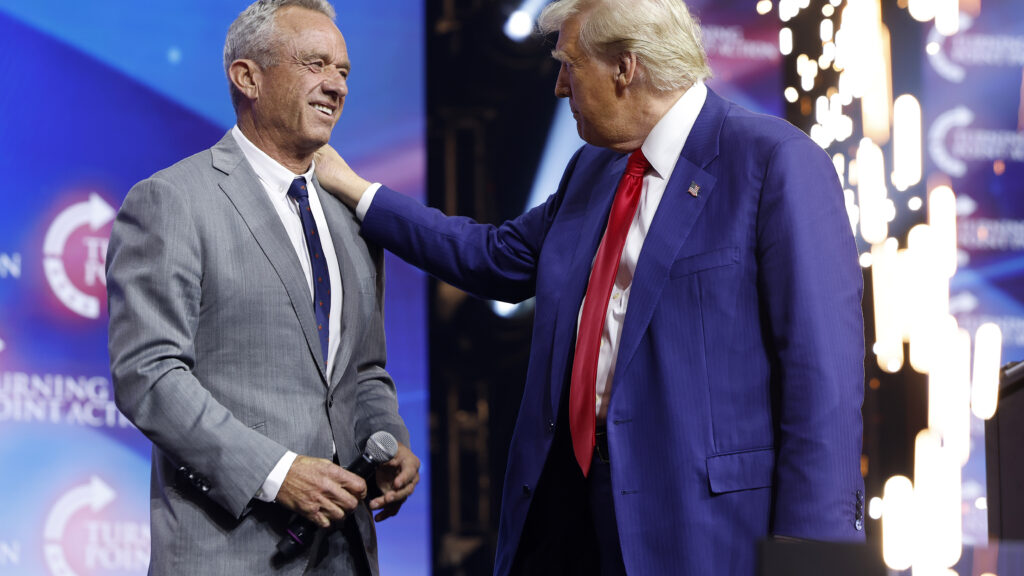President-elect Donald Trump suggested in a television interview on Sunday that he shares some of the concerns voiced by Robert F. Kennedy Jr., his choice to be secretary of health and human services, about the safety of some common childhood vaccines.
The comments, made on NBC’s “Meet the Press,” represent an increased sign of support for RFK Jr. taking action on that topic if he is confirmed by the Senate. Kennedy has spent decades making a zealous case that childhood vaccines cause autism and chronic illnesses, though more than a dozen scientific studies have failed to find any such links.
advertisement
When asked “Do you want to see childhood vaccines eliminated?” Trump responded: “If they’re dangerous for the children.
“When you look at some of the problems, when you look at what’s going on with disease and sickness in our country, something’s wrong,” Trump said. Asked if he was speaking about autism, Trump said that the rate of autism had increased from 1 in 100,000 to 1 in 100 over the past 25 years or so. “What’s happening?” He later called that “a pretty bad number for childhood vaccines.”
Trump overstated a dramatic increase: Rates of autism diagnosis have more than tripled since 2000, from 1 in 150 U.S. children in 2000 to 1 in 36 in 2020. Changes in criteria to diagnose the disease and greater awareness of the diagnosis are thought to be among the explanations for the increase.
The Centers for Disease Control and Prevention estimates that between 1994 and 2023, standard childhood vaccines prevented 1.3 million premature deaths and 32 million hospitalizations, or one hospitalization for every three children vaccinated.
A link between vaccination and autism was proposed in a now-discredited and withdrawn 1998 paper in The Lancet based on only 12 children that argued the combination measles, mumps, and rubella vaccine was causing the developmental disorder. It’s also been proposed that the condition might result from preservatives in vaccines, including one, thimerosal, that the CDC says has been removed from most inoculations. Others have theorized that giving too many vaccines results is what causes autism.
advertisement
But scientific research has not shown that children who receive more vaccines, or particular vaccines, have any increase in rates of autism. Within a few years of the first proposal of the link, a dozen studies in multiple countries had already been conducted showing no relationship between autism and vaccines. As new ideas emerged, like the suggestion that giving more doses of more vaccines is what leads to the problem, scientists tested those too and did not find evidence to back up that idea.
Kennedy, however, has continued to raise alarms about the safety of childhood vaccination, both at Children’s Health Defense, the nonprofit he ran before starting his own run for president, and during his presidential campaign.
Before his first campaign, Trump had expressed concerns that giving many vaccines at once might cause autism. In the run up to his first presidency, there was discussion that RFK Jr. would serve on a vaccine safety commission, but the commission never materialized.
During his “Meet the Press” interview, Trump was careful to say that the benefits of some vaccines was clear, noting, in particular, the polio vaccine, which he said he would not support removing. He also said that he had gathered executives from top pharmaceutical companies, RFK Jr., and his prospective director of the Centers for Medicare and Medicaid Services, Mehmet Oz, for a wide-ranging discussion that included vaccines.
“The polio vaccine is the greatest thing,” he said. “If somebody told me, ‘get rid of the polio vaccine,’ they’re gonna have to work real hard to convince me.”
In an aside, Trump said that he was also interested in targeting drug prices, in particular by dealing with “middlemen,” which would include the pharmacy benefit managers. These companies are meant to negotiate lower drug prices but many in the pharmaceutical industry say they create perverse incentives that actually raise drug prices while allowing them to capture more than their fair share of profits.
advertisement
“So we met, and we met for a long time, and we talked about pricing, and we talked about vaccines … we talked about pesticides, talked about everything,” Trump said. “And I think a lot of good things are going to come from [Kennedy]. He’s not going to upset any system.”

